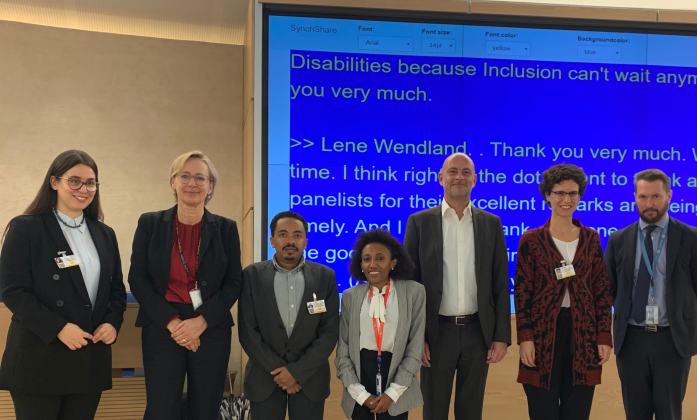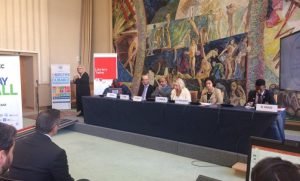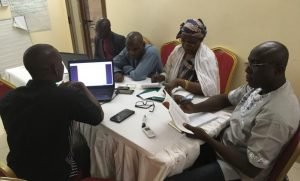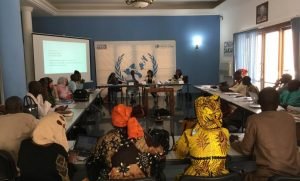On Wednesday, 27th November, from 9:00 to 10:15 a.m. at the Room XX of the Palais des Nations, the International Disability Alliance (IDA) and in collaboration with the Office of the High Commissioner for Human Rights (OHCHR), the International Labour Organization (ILO), the Office of the Special Rapporteur on the Rights of Persons with Disabilities, the EU funded Bridging the Gap Project- Inclusive Policies and Services for Equal Rights of persons with Disabilities, organised a panel session on inclusive employment.
This event was held in the framework of the 2019 Business and human Rights Forum in Geneva and seek to promote the employment of persons with disabilities and to consolidate the business case for inclusion.
The rich panel was moderated by Lene Wendland, Chief of the Business and Human Rights Unit of the Office of the UN High Commissioner for Human Rights and comprised by the following speakers:
- Carla Bonino, CSR and Sustainability head of Unit at ONCE Foundation.
- Dylan Winder, Counsellor and Team Leader Humanitarian, Protracted Crises and Migration of the UK Mission to the UN Geneva.
- Eleni Theodorou, Sustainability and Corporate Responsibility Consultant.
- Firehiwot Siyum, Independent Expert, former coordinator of the Ethiopian National Business and Disability Network.
- Thierry Fiquet, from SOCIEUX+, European Union Expertise on Social Protection, Labour and Employment.
- Berhanu Tefera, Executive Director of African Disability Forum and on behalf of the International Disability Alliance (IDA) provided concluding remarks.
Unique perspectives from government, the private sector, the disability movement, national business and disability networks, and international cooperation agencies were shared on how they are working to fulfil this common goal.

Eleni Theodorou, a Sustainability and Corporate Responsibility consultant opened the discussion by sharing her experience as a young talent with disabilities going through a non-inclusive interview selection to highlight that without inclusive recruitment processes, potential talent are filtered out, which it leads to untapped resources and markets that are left behind.
“Only four percent of the businesses that mention that they do diversity, they actually include disability. I’m telling you today to think beyond CSR because inclusive business is good business; inclusive business is sustainable business” she stated.

From ONCE Foundation, Carla Bonino presented their jointly publication with ILO Global Business and Disability Network “Making the future of work inclusive for people with disabilities”. From the roadmap issued by report for an inclusive future of work, she highlighted some actions to be taken by the different stakeholders. Among them, she stressed on the need of skills development and life‑long learning related to the future of work inclusive for people with disabilities; the need of a universal design embedded in development of all new infrastructure products and services, as well as the affordable and available assistive technologies newly developed. Ensuring gender equality and multi‑lateral collaborations between all stakeholders were also identified as transversal actions.

From the governmental side, Dylan Winder, Counsellor and Team Leader Humanitarian, Protracted Crises and Migration of UK Mission to the UN and WTO in Geneva presented how the private sector organization had been engaged in the Global Disability Summit in 2018 and highlighted some of the and key areas of progress.
Through his presentation he also stressed on the critical importance of having inclusive business in all situation, “even in context of climate change, forced displacement, we need to look at how people with disabilities can be better included in the economy”. “We do think that working together we can achieve real progress, particularly in some of those areas you might not think so, like in some of the real conflict and fragile areas of the world. But also in those areas where we see good development” he concluded.
From the perspective of the Ethiopian National Business and Disability Network, Firehiwot Siyum shared how the Network engage with the private sector and to bridge the gap that employers have when it comes to inclusion of persons with disabilities in the workplace and presented their five packages used by the Network; awareness raising programmes, facilitation of internship of persons with disabilities; sharing knowledge and publication were some of them.
It then followed the presentation of Thierry Fiquet, from SOCIEUX+, European Union Expertise on Social Protection, Labour and Employment, which shared some key recommendations and lessons learned based from the ground on how to facilitate access to employment for people with disability. Based on the actions on Peru, Ivory Coast, Georgia and Azerbaijan he highlighted the importance to improve the legal framework taking into account the changing needs of the labour market, employers, people with disabilities and society as a whole; the urgent need to switch from the medical assessments model to the social as well as to collect and systemized statistical data in the public and private sectors.
After a Q&A session, Berhanu Tefera, Executive Director of African Disability Forum and on behalf of the International Disability Alliance provided some concluding remarks, and stressed on the fact that inclusive employment is about non-discrimination and it goes beyond hiring persons with disabilities: “it needs to include the most underrepresented, marginalized persons with Disabilities and those with invisible disabilities”.
“All the companies and governments here have to make sure that policies and developments they’re putting in the ground are in compliance with the UN Convention and they also have to be in partnership and organizations of Persons with Disabilities because Inclusion can’t wait anymore” he concluded.







